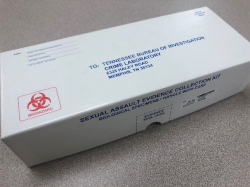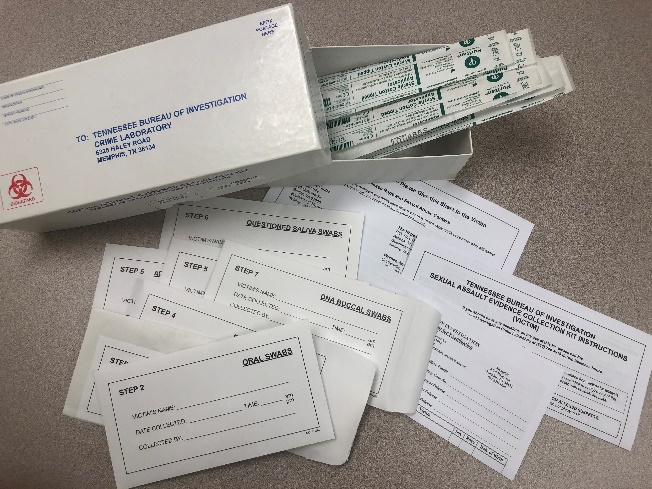Sex Assault Kits (SAK)
The Issue

In 2014, the Tennessee Legislature enacted TCA 38-6-123, tasking the Tennessee Bureau of Investigation with performing an inventory of untested Sexual Assault Kits (SAKs) stored in each law enforcement agency in the state. In previous years, a backlog of SAKs had been identified in many cities across the country; most notably in New York, Houston, and Detroit. In 2013, the City of Memphis identified 12,375 SAKs in their possession. However, not all of those were eligible for testing for various reasons. The inventory resulting from the 2014 legislation identified 9,062 untested SAKs held statewide. A total of 6,942 were identified by the City of Memphis as needing forensic analysis, with the remaining 2,120 distributed across the state. In 2015, the Tennessee Legislature enacted TCA 39-13-519, which set forth requirements for the collection, accessioning, and submission of SAKs.
2023 Update
Changes to state law in 2023, outlined in Public Chapter 249, require TBI to provide a quarterly report to the Tennessee General Assembly on the status of hiring 50 new forensic positions, along with the status of turnaround related to sexual assault kits.
Reports and Publications
Resources
Important Information
The tracking number associated with a SAK will be provided by the medical professional who conducts a forensic examination or law enforcement. The number should be retained, but should it become lost, survivors can contact their case's investigator, who will have access to this information.
Tennessee Rape & Sexual Abuse Centers
West Tennessee
Women's Resource & Rape Assistance Program Family Safe Center (WRAP) Memphis Jackson 901-800-6064 HOTLINE 1-800-273-8712
Crime Victims Rape & Crisis Center Memphis HOTLINE: 907-222-4350
Middle Tennessee
Sexual Assault Center Women Are Safe Nashville Centerville 1-866-811-7473 1-800-470-1117 Crisis Line: 615-259-9055
Matthew Walker Health Center, Inc. Domestic Violence & Sexual Assault Center Clarksville Murfreesboro 931-245-4368 615-896-7377 Crisis Line: 615-494-9262
East Tennessee
Partnership Rape Crisis Center The Crisis Center - Partners For Stronger Chattanooga Communities 423-755-2700 Bristol, VA 1-866-953-0484
The Hope Center, Inc. Sexual Assault Crisis Center of East Athens Tennessee 423-745-5289 Knoxville 865-522-7273
Genesis House Inc. Safe Haven Center Cookeville Knoxville 1-800-707-5197 865-558-9040
Rape Crisis Program Branch House Cleveland Blountville 423-476-3886 (423) 574-7233
Avalon Center Crossville 1-800-641-3434
Frequently Asked Questions
A Sexual Assault Kit or SAK contains items used by a medical expert in collecting evidence from a victim of sexual assault. The SAK includes a checklist, materials, and instructions, along with envelopes and containers to package any specimens collected during the exam.

The TBI is responsible for testing submitted evidence in compliance with the law and best practices. The TBI has three labs across the state, located in Memphis, Nashville and Knoxville. Forensic Scientists trained in Forensic Biology test any SAK submitted to the TBI and enter eligible DNA profiles into the national CODIS (Combined DNA Index System) database.
Tennessee received a grant from the District Attorney of New York City in 2016 totaling $973,311. These funds covered the cost of a private lab to test 1,265 of the 2,120 untested SAKs inventoried across the state, outside of Memphis. The remaining 855 were determined to be part of regularly submitted evidence and were tested by TBI Forensic Scientists at the three labs across the state.
All SAKs identified by the City of Memphis were tested by two private laboratories. According to MPD, between 2013 and 2019, 9,658 SAKs were shipped to private laboratories for testing. The City of Memphis covered the cost of these tests through grants, city funds and charitable donations. The results generated during testing by private labs for potentially CODIS eligible profiles were reviewed by TBI Forensic Scientists in Memphis, Nashville and Knoxville. This project has placed considerable strain on the TBI Forensic Biology and CODIS Units.
Yes. All of the SAKs have been tested by either the TBI or a private lab. However, review of the tests performed by the private lab continues as well as the entry of data into the CODIS database.
Private labs are able to conduct serology and deoxyribonucleic acid (DNA) testing. However, private labs are not permitted access to the CODIS (Combined DNA Index System) database. Thus, TBI Forensic Scientist are required to perform a technical review of each case tested by a private lab, upload the results to the CODIS database, and report all potentially CODIS eligible DNA profiles generated from the SAKs.
More than 5,000 DNA profiles from these SAKs have been added to the CODIS database resulting in more than 2,000 CODIS hits. This has provided new information for more than 1,500 cases of sexual assault.
TCA 39-13-519 aims to prevent such an occurrence by requiring law enforcement agencies to develop policies and procedures to handle SAKs in a timely manner. The statute requires all law enforcement agencies to submit a SAK for testing within 30 days of a police report being filed.
Once a victim files a police report, TCA 39-13-519 requires all law enforcement agencies in Tennessee to submit SAKs to the TBI Crime Lab or other similar qualified laboratory for either serology or deoxyribonucleic acid (DNA) testing within 30 days. However, various agencies have internal policies with a shorter submission time. For instance, the Memphis Police Department requires all SAKs to be submitted for testing within 96 hours of collection.
Yes, if the victim is a minor. No, if the victim is an adult. An adult victim has to give permission for his/her SAK to be released for testing. If an adult victim elects not to report the alleged offense to law enforcement at the time of the forensic medical examination, the SAK becomes a Hold Kit and is marked with an identifying number, not the victim’s name. The SAK is stored for a minimum of ten years by the appropriate law enforcement agency. The victim is given the identifying number placed on the Hold Kit, information about where and how long the kit will be stored, and the procedures for making a police report.
If an adult victim does not want to pursue criminal charges at the time of the forensic medical examination, the SAK becomes a Hold Kit and is marked with an identifying number, not the victim’s name. The SAK is stored for a minimum of ten years by the appropriate law enforcement agency. The victim is given the identifying number placed on the Hold Kit, information about where and how long the kit will be stored, and the procedures for making a police report.
A Hold Kit is a SAK from an adult victim who elected not to report the alleged offense to law enforcement at the time of his/her forensic medical examination. The SAK is stored for a minimum of ten years by the appropriate law enforcement agency. The victim is given the identifying number placed on the Hold Kit, information about where and how long the kit will be stored, and the procedures for making a police report. All SAKs collected for juvenile victims are submitted for testing.
Many factors can affect the length of time it takes for a SAK to be tested. Manpower is a major factor. Each lab has a limited number of Forensic Scientists trained in Forensic Biology. The amount of evidence submitted by law enforcement agencies also affects turnaround times. Evidence that is designated as a “rush case” can also delay testing of other SAKs. Rush cases can be those that involve public safety or where the victim is especially vulnerable, which can include children or the elderly.